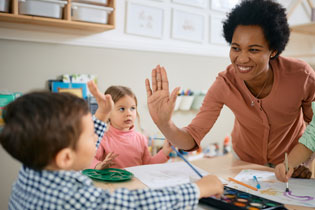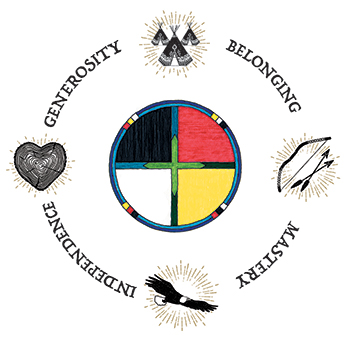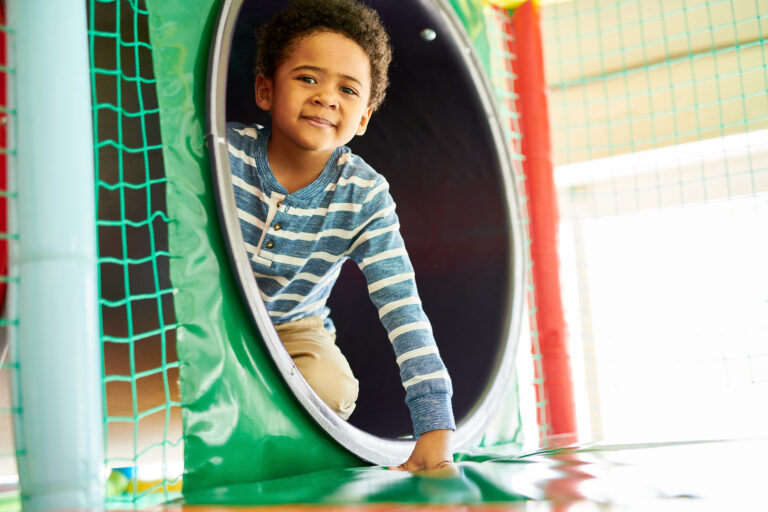School readiness and success: Are you meeting basic needs?
Maslow’s Hierarchy of Needs and the Circle of Courage model of Resilience
Conversations and curriculums to promote school readiness in early childhood programs tend to focus on cognitive development, academics, concentration, and focus. In many cases, the priority must be basic needs. For children to be successful in school, they need to be well-fed, sleep well, feel safe at home, and have confidence in themselves. Maslow’s Hierarchy of Needs is a popular theory, which focuses on a series of needs to be successful. He considered five needs – physiological, safety, love, esteem, and self-actualization- and put them in a pyramid. A person reaches their fullest potential, beginning with the foundational aspects of the basic needs – physiological and safety – and only when those needs are met does a person eventually reach self-actualization.
The Circle of Courage, a model of resilience, suggests there are four universal needs for all human beings. These fit within the framework of Maslow’s Hierarchy and include belonging, mastery, independence, and generosity.
Both are helpful reminders that all learners are less likely to succeed if their basic needs are unmet. And for many children experiencing too much stress and trauma, their needs are not met. The hierarchy of needs can help identify gaps; for example, breakfast might need to be provided for children who come to school hungry.
Considerations and Suggestions for meeting needs in early childhood centers
If you go through the details of the needs, this may become clearer in the context of children who are experiencing stress and trauma and what they need most to have a successful school experience.
Physiological needs include proper nutrition and water, access to fresh air, and enough rest, exercise, and warmth. Trauma-informed considerations include:
Is the child eating enough nutritious food?
What is the child’s sleep schedule?
Does the child have shoes that fit correctly?
Suggestions to meet physiological needs:
- Snacks, free and reduced breakfast, and lunch options.
- Available drinking water, working drinking fountains, and extra water bottles for those who need them.
- Extra clothes, coats, hats, and mittens for accidents and playing outside in colder weather.
- Nap or rest time.
- Plentiful undirected play and exploration.
Safety needs are about security and feeling safe – physically and emotionally, as well as the need to have shelter/home and stability in one’s life. Trauma-informed considerations include:
Does the child know what to expect?
Do they have a predictable routine?
Is support provided when the child is learning a new skill?
Suggestions to meet the need of safety:
- Rules – many verbal reminders and visuals posted.
- Expectations – consistent and follow through.
- Support during transition times.
- Feedback and support with everything.
Belongingness and love have to do with others, the social side of feeling that you belong, are connected, loved, and included. Trauma-informed considerations:
Does the child have friends?
Is the child securely attached to at least one caring adult?
Have adults modeled how to share and take turns?
Suggestions to support meeting the need for belonging and love:
- Cooperation experiences with ample support.
- Opportunities to take turns and share toys and supplies.
- Plentiful social and playtime with other children.
Esteem, Mastery, and Independence concern the inner self – having feelings of achievement, being recognized, having power over one’s life, and being a unique person with strengths and talents. Trauma-informed considerations:
Does the child have someone who pays attention to their achievements?
How often does the child receive compliments?
What is the child good at doing?
Does the child have access to co-regulation with a caring adult?
Suggestions for meeting the needs of esteem, mastery, and independence:
- Notice children – often smile, wink, fist bump, and say their names.
- Compliments from adults and peers.
- Laughter and smiles galore.
- Practice and support with emotional awareness and regulation.
Self-actualization and Generosity involve achieving one’s full potential, being creative, and finding that specialness of oneself. Trauma-informed considerations:
Does the child have access to a safe area to play with supervision?
Has the child ever completed a chore such as putting away toys in a box?
Does the child show empathy for others?
Suggestions to meet the needs of self-actualization and generosity:
- Free play and exploration.
- Opportunities to help one another.
- Age-appropriate classroom jobs.
- Service learning – making pictures/cards for hospitals.
Find more resources for supporting kids in early childhood care here.





